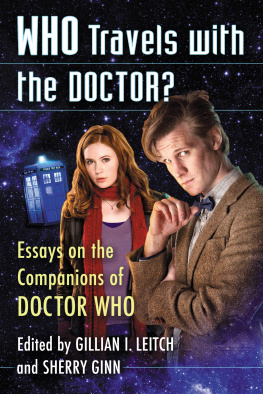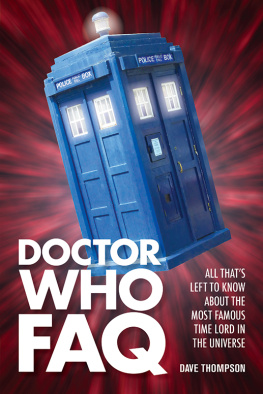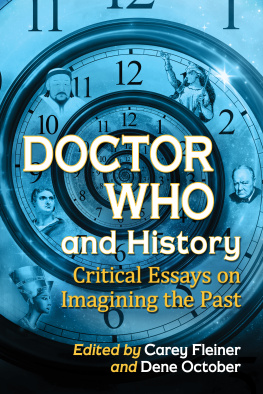
Who Travels with the Doctor?
Essays on the Companions of Doctor Who
Edited by Gillian I. Leitch and Sherry Ginn

McFarland & Company, Inc., Publishers
Jefferson, North Carolina
ALSO OF INTEREST AND FROM MCFARLAND
Doctor Whoin Time and Space: Essays on Themes, Characters, History and Fandom, 19632012 (2013), edited by Gillian I. Leitch
The Multiple Worlds of Fringe: Essays on the J.J. Abrams Science Fiction Series (2014), edited by Tanya R. Cochran, Sherry Ginn and Paul Zinder
The essay by Sherry Ginn uses portions of her essay from Doctor Whoin Time and Space by permission of McFarland & Company, Inc., Publishers.
LIBRARY OF CONGRESS CATALOGUING DATA ARE AVAILABLE
BRITISH LIBRARY CATALOGUING DATA ARE AVAILABLE
e-ISBN: 978-1-4766-2412-9
2016 Gillian I. Leitch and Sherry Ginn. All rights reserved
No part of this book may be reproduced or transmitted in any form or by any means, electronic or mechanical, including photocopying or recording, or by any information storage and retrieval system, without permission in writing from the publisher.
McFarland & Company, Inc., Publishers
Box 611, Jefferson, North Carolina 28640
www.mcfarlandpub.com
This book is dedicated to Sherrys brother,
Neal (Freddie C. Ginn, 19562015),
who did not live to see it completed.
Acknowledgments
Having the opportunity to write about Doctor Who is perhaps the fans ultimate dream, aside from actually being a companion on the series itself. I want to thank everyone who has made this book possible, most of all my co-editor Sherry. To our contributors, I am sincerely grateful for their hard work and patience. I am living the dream, really. Now, if they need a new companion.Gillian I. Leitch
I believe my dedication says it allthis has been a very distressing year. I really appreciate the support I have received from my friends during this difficult time. Thanks to all of our contributors for being so understanding about the delays. Thanks to Gillian for co-editing another book with me and for our ultimate fan experience at this years Ottawa Comiccon: Rose Tyler and Lt. Commander Uhura. This book is for all Whovians out therewhether from the classic era or the new. There are so many companions who need studywhy not take on the job? By the way, my favorite companions are Donna Noble, Sarah Jane Smith, and River Song.Sherry Ginn
IntroductionComrade, Confidante, Companion, Chum
A Friend by Any Other Name
Sherry Ginn and Gillian I. Leitch
In 900 years of time and space, Ive never met anyone who wasnt important.The Doctor, A Christmas Carol, 2010
When reading a novel or short story, one is privy to the thoughts, emotions, and motives of the characters therein. Along with the plot elements, the authoreither as a third-person observer or as the first-person narratorprovides the reader with the information necessary to understand what is happening and why. A good author plays fair with the reader; in detective fiction the reader is provided with the clues necessary to solve the mystery. Similarly, enough information is provided in other genres for the reader to participate in the events in question.
However, drama is entirely different. In a live performance the audience is not privy to the characters inner-workings. In order to provide such information to the audience, characters engage in exposition about events that have occurred prior to the present story-time. In this way the audience is aware of events that have occurred beyond its immediate awareness and is informed of what is happening along with the characters in the drama. They can passively observe the events as they unfold, or they can participate actively and perhaps solve the mystery before those on screen do. Television has used these narrative forms in many series with recurring characters, at least one of whom is considered the main character and another who is the sidekick. Famous couples of this type include Starsky and Hutch, Cagney and Lacey, Crockett and Tubbs, and McGarrett and Danno. Within the science fiction and fantasy universe these include Batman and Robin, Kirk and Spock, Buffy and the Scoobies.
Perhaps the most developed of the sidekicks is Dr. John Watson, who in literature and in film and television adaptations of Sherlock Holmes, is used to forward both the mystery in play and the understanding of the character Sherlock Holmes. As P. D. James stated, writers obviously felt the need to have a character to whom the detective could communicate, however slightly, the progress of his investigation, as much for the readers benefit as for his own. Watson was the ultimate sidekick, acting as narrator in the written works, and gateway character in the performed adaptations. Sherlock Holmes, the enigmatic detective, is viewed through the eyes of Watson, and the clues to the evitable mystery are presented to him and the audience to interpret.
Doctor Who is a great deal like a detective mystery and the companion much like Watson. Each adventure is a bit of a mystery: Where are they? What is going on? How can this be resolved? Each episode takes place in a different time and place. The story then requires a narrative trick for the audience to understand the circumstances, and the source of dramatic tension in the adventure. The Doctor is expected to fix things, but it is through the companion that scene is set, and a great deal of the answers are generated. The companion gets into the situation and interprets the events much as the audience does, and the Doctorenigmatic like Sherlock Holmessolves the problems as they arrive. This can vary from saving the companion from certain death (preceded by a great deal of screaming) or having the companion assist them as they find a solution, usually scientific, to defeat an enemy or save a people.
For Doctor Who, the sidekicks are essential to the story, and include the numerous companions who have traveled with the Doctor for the past 50 years. As Malcolm Hulke and Terrance Dicks wrote in 1972:
[H]eroes on television must have someone to talk to. This is known as the confidant, a person to whom things can be explained. In this way, the audience can be told what is going on. So the Doctor had to have companions. The creators of the idea, [Sydney] Newman and [Donald] Wilson, decided that by various means the Doctor should pick up young companions on his journeys, but that of course later he should always try to get them back to the place and the time where he first met them.
The companions job was to serve as a stand-in for the audience, to query the Doctor as to what was happening, and to be suitably impressed by the wonders of the universe and the Doctors brilliance (not necessarily in that order). Nevertheless the companions job has changed over the years, and it can be argued that the companions of new Who have a much more difficult job than those of classic Who. Russell T. Davies believes that the companions make the show more accessible to the public. Companions in the New Who are far more developed than those in the classic series: they have real lives, jobs, friends and families; they come from a world with which we can all identify.
While the Doctor is a permanent fixture of the narrative, the companions change. Over the run of the series, the Doctor has been joined by more than 43 different companions. They stay for a while, and then they leave. Katy Manning, who played companion Jo Grant (19711973) for the third Doctor, thinks that a companion should change after 3 seasons, as a new companion keeps the show fresh and changes the dynamics of the relationship between the companion and the Doctor.
Next page









